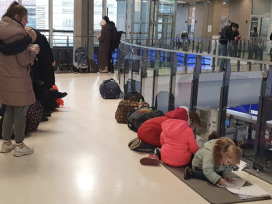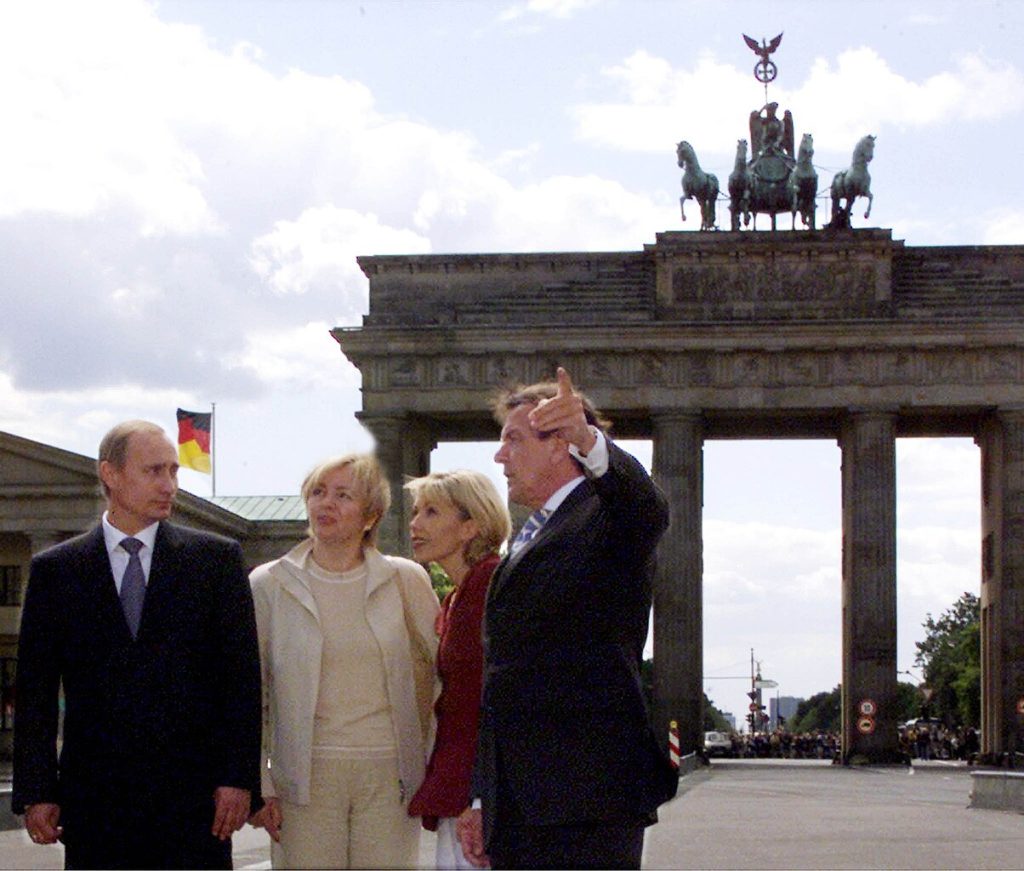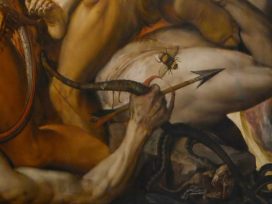
'It’s important to be open'
A Knowledgeable Youth podcast
Remaining in a new country or returning home? The Knowledgeable Youth podcast delves into the complex decision-making refugees face when migrating, together with researcher Olena Yermakova.
Even after the disgracing of Gerhard Schröder and Scholz’s trumpeted Zeitenwende, German Social Democracy has been unable to dispel suspicions that it continues to sympathise with Russia. The authors of a recent book discuss this ignominious history, in which Schröder was the main but by no means only actor.
Kaja Puto: Where does the German left’s sympathy for Russia come from?
Reinhard Bingener: In Germany, we have four leftwing parties: the Social Democratic Party of Germany (SPD), the Greens (Die Grünen), the Left (Die Linke) and the new Sahra Wagenknecht Alliance (BSW). Each has a slightly different attitude towards Russia. In the case of the SPD, the 1960s and 70s were key to its development. This was the time of the pacifist movements and young Social Democrats were pulling the party toward Marxism. Gerhard Schröder, the most prominent of the SPD’s pro-Russian politicians, belonged to this generation, even if he soon abandoned Marxism.
The Greens grew out of the same ideological climate, but in their case the concept of human rights came to the fore. This has led them to position themselves against Russia and thus be more sympathetic to transatlantic cooperation. The Left, on the other hand, is largely a post-communist project. Anti-Americanism plays an even greater role in the party than in the SPD, and Marxist theory continues to be influential. The same is true of the Sahra Wagenknecht Alliance.
As a member of government during all but one of the legislature periods of the past 25 years, the SPD has played the biggest role of any party in shaping Germany’s foreign policy toward Russia. It is currently the leading partner in the coalition that has ruled Germany since 2021. How is it possible that it still maintains this naive pacifism?
Markus Wehner: As we show in the book, this policy was shaped by three factors. The first is Germany’s widespread anti-Americanism, which is particularly strong on the left, and whose consequence is pro-Russianism. It reached its peak when a rightwing president came to power in the United States in the first decade of the new century. During the George W. Bush presidency, which coincided with Putin’s first two terms, leading SPD politicians proclaimed that we needed equidistance, i.e. as close a relationship with NATO as with Russia.
The Polish left is also critical of the US and various NATO interventions, yet it is not pro-Russian.
RB: Yes, but Russia never colonized Germany as it did Poland for long periods. In Germany, the experience was limited to the GDR – that is, for forty-five years and for a quarter of the whole population. Added to this is the belief, historically rooted in German culture, in the shallowness of the United States and the West. This is countered by the deep soul that is supposed to unite Russians and Germans. So cultural hubris also plays a role.
MW: Another factor that has influenced Germany’s policy towards Russia is German guilt about the crimes committed in the USSR during World War II. Many Germans, especially those of the older generation, continue to believe that we owe Russia peace. By this logic, the twenty million plus citizens of the USSR who died during the war were Russians, even though Ukrainians, Belarusians and members of many other nations were also among them.
And the third factor?
MW: Ostpolitik, designed in the 1970s by the SPD under Willy Brandt. Originally motivated by a desire for rapprochement with the GDR, Ostpolitik evolved into a policy of reconciliation and rapprochement with the entire Eastern Bloc. This was when the Oder-Neisse border was recognized and trade began with the USSR and other countries in the region. Soviet gas began to flow to Germany. At the same time, Germany was spending 4-5 per cent of its GDP on defense. Cooperation was accompanied by Cold War deterrence.
While we view the first phase of Ostpolitik positively, we argue that the second phase, during which the SPD focused on security partnerships with communist regimes, was the prelude to Germany’s naive cooperation with independent Russia under Putin. During the 1980s, the Social Democrats treated oppositionists in Poland and Czechoslovakia as troublemakers. Suffice it to say that Willy Brandt refused to meet with Lech Walesa during his trip to Poland on the fifteenth anniversary of the Treaty of Warsaw in 1985. Many leading Social Democrats also opposed German reunification.
Why?
RB: Partly because they didn’t want Germany to become a big, hegemonic country in the centre of Europe again. Belief in the stability of socialist regimes and ideological affinity probably also played a role.
MW: Definitely. When the unification process began, I was watching the coverage of the SPD presidium meeting. Leftwing party politician Heidemarie Wieczorek-Zeul said that if the result of unification were a strengthening of NATO and a victory for capitalism, she would fight against it with all her might.
And today the SPD boasts that Ostpolitik brought the wall down…
MW: When German reunification began to be widely perceived as a success, the SPD decided to take credit for it. For ideological reasons, they were unwilling to recognize the role of Ronald Reagan and his rearmament policy, for example, or that of John Paul II, who helped bring about the transition in Poland. So they created the myth about the influence of Ostpolitik .

16 June 2000. Image: Presidential Press and Information Office / Source: Wikimedia Commons
In 1990 – the year of German reunification – Gerhard Schröder became Minister President of Lower Saxony. It was at this point that the former chairman of the Young Socialists brought himself and his party into contact with big business. How did this happen?
RB: The peculiarities of the state of Lower Saxony, which has stakes in large companies such as Volkswagen, are partly responsible for this. Salzgitter AG – a huge steel producer that has been around since the 1970s – produced gas pipes for the USSR and then later for the Nord Stream pipeline. The minister president of Lower Saxony sits on the supervisory boards of such companies.
In addition, Schröder likes the macho business world. He enters the universe of older successful men, they impress him with their willingness to take risks, mutual loyalty and money. He starts with friendships with motorcycle gangs and ends with autocrats. He respects Recep Tayyip Erdoğan or Vladimir Putin because they are strong men who have succeeded.
However, while Schröder’s views on economic policy are changing, he remains consistent in his foreign policy vision. In the 1970s and 1980s he travels to the USSR, and in the 1990s – as minister president of Lower Saxony – to Russia.
MW: Money has always played an important role for Schröder, even when he was chancellor. When he travelled with business leaders, he felt uneasy about the fact that they all earned more than him. It is probably also because he was born into poverty. His mother was a cleaner, his father was killed in WW2 when he was a few years old. In the world of power and money, Schröder was a nouveau riche.
Vladimir Putin used Schröder’s biography to get closer to him. He had a specific reason for doing so: a few years before, Putin had defended his doctorate on the use of gas exports as a foreign policy instrument.
MW: Asked at the time what he did for the KGB, Putin replied that he was an expert on human relations. Indeed, he is very good at this and learns a lot about the object of his interest, both the good and the bad sides. Putin also comes from poverty, from a Leningrad neighbourhood of – as he puts it – broken glass. Like Schröder, he played sports in his youth and rubbed shoulders with the criminal community, before finding his way into politics and gaining power.
Moreover, Putin knows how to make people feel that they are especially important. He let Schröder know that he, Putin, could learn a lot from the older and more experienced politician. He invited Schröder privately to Moscow and spoke to him in German without an interpreter. The men went to the sauna together, went sledding in the park with their wives, and for Schröder’s sixtieth birthday Putin brought a Cossack choir to the theatre in Hannover to sing the anthem of Lower Saxony. Later Putin even arranged for his German friend to adopt two Russian children. Schröder used to say that German–Russian relations had grown deeper than ever before. But they were actually his private relationships.
How did this friendship translate into Chancellor Schröder’s domestic policy?
MW: Schröder presented the interests of the German energy industry as German national interests. When there was talk of buying Russian gas, Schröder did not say that doing so was in the interest of the German energy industry or the German economy, but that in Germany’s interest. This is how he argued in order to accelerate the construction of Nord Stream. Things got even more interesting when he ceased to be chancellor, while continuing to direct German policy towards Russia from the back seat.
Angela Merkel replaced Schröder as chancellor in 2005. The CDU went on to rule Germany for four terms, three of them in coalition with the SPD.
MW: Schröder then became part of the Russian energy industry as chairman of Nord Stream’s supervisory board. At the same time, he played the role of a former chancellor. And it influenced the shape of the German government, by placing two of his close associates –Frank-Walter Steinmeier and Sigmar Gabriel – as foreign minister and as minister of the economy respectively.
For a very long time the German energy industry imposed an import limit of no more than 30 percent from one supplier. Under Gabriel, the limit was lowered to 55 percent. This happened after the annexation of Crimea.
German politicians convinced the public that Russian gas was the cheapest. In your book, you prove that this was not true.
MW: No LNG terminals were built that would have allowed the purchase of gas from other sources, or at least the negotiation of terms with Moscow. Germany thus became dependent on Russian gas and allowed the supplier to dictate prices. Russia was believed to be a safe supplier and that we had nothing to fear.
RB: German gas storage facilities have been sold to Russia. It can be said that Russia has exploited the liberalization of European energy markets for its own ends. Gazprom has become not only a producer, but also the owner of gas infrastructure, gas pipelines and gas storage facilities. It built its position on this. The Germans believed that European security was impossible without good relations with Russia. When full-scale war broke out, they discovered to their surprise that the storage facilities were empty.
Gerhard Schröder then became a villain. He was stripped of his office in the Bundestag, and he lost his honorary citizenship of Hanover, and there was an attempt to remove him from the SPD. Did no one else feel guilty?
RB: Schröder became the chief culprit, while other party politicians responsible for pro-Russian policies remained in their positions. Neither Frank-Walter Steinmeier, currently the Germany’s president, nor Sigmar Gabriel, who heads the Atlantic Bridge, an association promoting German-American relations, has resigned. Manuela Schwesig, who was instrumental in the creation of the infamous Climate Protection Foundation, set up to circumvent US sanctions against Russia, is still the minister president of Mecklenburg-Vorpommern.
Some tried to justify themselves, others disappeared for several weeks. And when the dust settled, they slowly returned to their roles. I would call this a huge political achievement for the SPD.
MW: It should be added, however, that it was at the expense of their credibility. At the start of the war, Steinmeier offered to visit Ukraine and was turned down. And Schwesig is hardly the SPD’s great hope anymore.
How has 2022 changed the German left?
RB: The SPD has started paying more attention to the role of energy policy in defence, as well as to eastern European countries – not only Ukraine, but also Poland and the Baltic states. More money has been allocated to armaments – Germany has finally succeeded in reaching its goal of spending 2 per cent of its GDP on defence. But while Olaf Scholz himself has been critical of Russia since 2017, there are still people in the party who speculate about re-establishing contact with Moscow.
The Greens have hardened their pro-Ukrainian position and have also begun to advocate for a strengthening of defence and greater openness to military structures, most notably NATO. Die Linke, on the other hand, have held on to the primacy of ‘peace policy’ and remain strongly critic towards NATO and armaments.
MW: As for the SPD, statements by party chairman Lars Klingbeil, once a politician with ties to Russia, seem telling. After the full-scale invasion, he repeatedly stressed that Germany should have listened more closely to its NATO partners in the east, and that today there is no longer a question of security with Russia, but rather security in the face of Russia. Many senior SPD members do not necessarily like this narrative, however.
How sustainable is this transformation of the SPD? Scholz now seems to be putting the brake on military aid and has refused to deliver Taurus long-range missiles. He has also publicly commented on NATO’s undisclosed involvement in operating similar missiles in Ukraine.
RB: It can’t be ruled out that Russia-sympathisers will come to the fore again. Polls clearly indicate that the public is afraid of confrontation. The majority of citizens do not want Germany to provoke the Russian bear and are against increasing the supply of weapons. Though he supports Ukraine in no uncertain terms, Scholz takes this sentiment into account.
MW: Opposition to rearming Ukraine is strong especially in eastern Germany. Although the region experienced Soviet occupation, sympathy and respect for Russia is still very strong. To make matter worse for Scholz, the German economy is not in the best shape, and citizens are experiencing rises in the cost of living. Against this backdrop, members of the SPD’s left wing are sceptical of a radical increase in defence spending, which they fear will result in a shortage of money for education, social spending and climate protection.
There is a small but real possibility that Russia will attack NATO countries in the future. Is Germany not afraid of such a scenario?
RB: From the German perspective, this threat is more remote than for the Poles, if only because, unlike you, we do not border Russia. As Markus says, the emotional core of the German approach to Russia is a fear of teasing the bear. At the same time, any sensible politician today realizes the importance of deterrence. Both Poland and Germany rely on transatlantic support, and Germany is part of the NATO agreement on sharing tactical nuclear weapons. However, the spectre of a Donald Trump victory should make us think about whether it’s time to build a European deterrent.
Published 12 April 2024
Original in English
First published by Krytyka Polityczna / Display Europe
Contributed by Krytyka Polityczna © Reinhard Bingener / Markus Wehner / Kaja Puto / Krytyka Polityczna
PDF/PRINTSubscribe to know what’s worth thinking about.

Remaining in a new country or returning home? The Knowledgeable Youth podcast delves into the complex decision-making refugees face when migrating, together with researcher Olena Yermakova.

The difference between knowing from distance that war is being waged and living that reality couldn’t be more extreme. But can awareness of multiple repercussions turn protective disassociation from violence into active solidarity? ‘The Most Documented War’ symposium in Lviv, Ukraine, provides valuable pointers regarding engagement and responsibility.